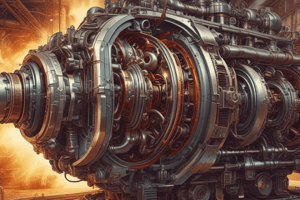Podcast
Questions and Answers
Which law of thermodynamics is concerned with the conservation of energy?
Which law of thermodynamics is concerned with the conservation of energy?
- Third Law
- Zeroth Law
- Second Law
- First Law (correct)
What does the First Law of Thermodynamics alone not guarantee regarding a process?
What does the First Law of Thermodynamics alone not guarantee regarding a process?
- Increase in entropy
- Conservation of mass
- Occurrence of the process (correct)
- Efficiency of the process
Which concept is NOT explained by the First Law of Thermodynamics?
Which concept is NOT explained by the First Law of Thermodynamics?
- Conservation of energy
- Spontaneity of a process (correct)
- Direction of a process
- Possibility of heat transfer from low to high temperature bodies
Why is heat transfer from a low temperature body to a high temperature body practically infeasible?
Why is heat transfer from a low temperature body to a high temperature body practically infeasible?
Which law addresses the spontaneity of a thermodynamic process?
Which law addresses the spontaneity of a thermodynamic process?
What is one aspect that the First Law of Thermodynamics allows but is not practically feasible?
What is one aspect that the First Law of Thermodynamics allows but is not practically feasible?
In which type of process does irreversibility occur?
In which type of process does irreversibility occur?
Which of the following is an example of an irreversible process?
Which of the following is an example of an irreversible process?
What is the main factor affecting the efficiency of a heat-engine cycle?
What is the main factor affecting the efficiency of a heat-engine cycle?
Why can't reversible cycles be achieved in practice?
Why can't reversible cycles be achieved in practice?
What was Sadi Carnot's contribution to improving practical heat engines?
What was Sadi Carnot's contribution to improving practical heat engines?
Which process allows molecules to blend from a region of high concentration to low concentration?
Which process allows molecules to blend from a region of high concentration to low concentration?
What is the main function of a heat engine?
What is the main function of a heat engine?
In a heat engine, where is heat absorbed from?
In a heat engine, where is heat absorbed from?
Which device removes heat from a low-temperature source?
Which device removes heat from a low-temperature source?
What is the primary function of a heat pump?
What is the primary function of a heat pump?
How does a refrigerator differ from a heat engine?
How does a refrigerator differ from a heat engine?
What is the function of a sink in the context of heat transfer?
What is the function of a sink in the context of heat transfer?
What characterizes a spontaneous process in thermodynamics?
What characterizes a spontaneous process in thermodynamics?
What distinguishes a non-spontaneous process from a spontaneous one?
What distinguishes a non-spontaneous process from a spontaneous one?
Why might a non-spontaneous process occur even when the system lacks sufficient energy?
Why might a non-spontaneous process occur even when the system lacks sufficient energy?
What does the second law of thermodynamics declare about certain processes?
What does the second law of thermodynamics declare about certain processes?
Which hypothetical body has a large thermal energy capacity and can supply or absorb heat without temperature change?
Which hypothetical body has a large thermal energy capacity and can supply or absorb heat without temperature change?
What principle does the second law of thermodynamics place constraints upon?
What principle does the second law of thermodynamics place constraints upon?
What is the formula for calculating cycle efficiency?
What is the formula for calculating cycle efficiency?
What does Carnot efficiency describe?
What does Carnot efficiency describe?
Who is credited with finding that all reversible heat engines operating between the same two temperatures have the same thermal efficiency?
Who is credited with finding that all reversible heat engines operating between the same two temperatures have the same thermal efficiency?
What is needed to calculate the Carnot efficiency?
What is needed to calculate the Carnot efficiency?
What is true about the thermal efficiency of actual heat engines compared to the Carnot efficiency?
What is true about the thermal efficiency of actual heat engines compared to the Carnot efficiency?
Which cycle is associated with the Carnot heat engine?
Which cycle is associated with the Carnot heat engine?
Flashcards are hidden until you start studying





